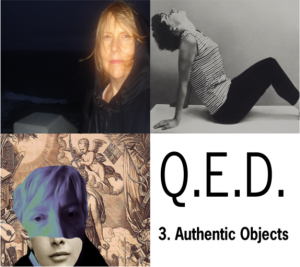Wednesday June 13th 2012
Does an object need a form?
Does an objection?
Does anything speak for itself?
Wednesday | June 13, 2012 | 7:00 p.m.
MAK Center Schindler House
835 N. Kings Road
West Hollywood, CA 90069
Featuring Judie Bamber, Dodie Bellamy, and Terry Castle. Moderated by Vanessa Place.
$7 General; Free for Friends of the MAK Center and Members of Les Figues Press with RSVP(office[at]makcenter.org).
 Q.E.D. is a short series of long conversations on queer art and literature. The series includes three events over the course of three months (April 11, May 9 & June 13, 2012); each evening features a writer, an artist and a critic in a conversation about contemporary issues and conditions of queer art and literature. The series is hosted and moderated by Les Figues Press Co-Director Vanessa Place, and will be recorded and made available online. The program is curated by Les Figues Press and supported through a Cultural Resource Development Grant from the City of West Hollywood.
Q.E.D. is a short series of long conversations on queer art and literature. The series includes three events over the course of three months (April 11, May 9 & June 13, 2012); each evening features a writer, an artist and a critic in a conversation about contemporary issues and conditions of queer art and literature. The series is hosted and moderated by Les Figues Press Co-Director Vanessa Place, and will be recorded and made available online. The program is curated by Les Figues Press and supported through a Cultural Resource Development Grant from the City of West Hollywood.
Q.E.D. takes its name from a novel by Gertrude Stein; Q.E.D. (Quod Erat Demonstrandum, or Things as They Are) was one of the earliest coming stories, written in 1903 though not published until 1950, after Stein’s death.
***
About the Participants
Judie Bamber is an artist living and working in Los Angeles, CA. Her BFA was received from California Institute of the Arts in 1983. She is the recipient of the 2012 Richard Diebenkorn teaching fellowship, the 2008 California Community Foundation fellowship and the 2007 City of Los Angeles individual artist fellowship. She is currently a senior lecturer in Graduate Fine Arts at Otis College of Art and Design. Her work has been included in many national group exhibitions, most notable: Sexual Politics: Judy Chicago’s Dinner Party in Feminist Art History, UCLA Hammer Museum of Art, Los Angeles; In a Different Light, University Art Museum, University of California, Berkeley, California; Paper Trails: The Eidetic Image, Krannert Art Museum, University of Illinois at Urbana-Champaign, Illinois; and L.A. Hot and Cool, MIT List Visual Arts Center, Cambridge, Massachusetts. She is represented by Angles Gallery in Los Angeles, CA and she most recently exhibited there in 2011.
Dodie Bellamy’s most recent book is the buddhist (Publication Studio). Time Out New York named her chapbook Barf Manifesto (Ugly Duckling) “Best Book Under 30 Pages” for 2009. Other books includeAcademonia, Pink Steam and The Letters of Mina Harker. Her book Cunt-Ups won the 2002 Firecracker Alternative Book Award for poetry.
The writer and critic Terry Castle – described by the late Susan Sontag as “the most expressive, most enlightening literary critic at large today” – has taught at Stanford University since 1983. Her scholarly interests include eighteenth-century British fiction, the Gothic novel, Jane Austen, the First World War, English art and culture of the 1920s and 1930s, autobiography and biography, and gay and lesbian writing. She has published eight books on diverse subjects, including Masquerade and Civilization(1986), The Apparitional Lesbian (1993), and the prize-winning collection, The Literature of Lesbianism: A Historical Anthology from Ariosto to Stonewall (2003). She is also a well-known essayist and has written frequently for the London Review of Books, Atlantic, New Republic, Times Literary Supplement, New York Times Book Review, and other periodicals. Her latest book, The Professor and Other Writings was published by HarperCollins in January 2010. In 1997 she was named Walter A. Haas Professor in the Humanities at Stanford. In her spare time, she is a visual artist, music and book collector, and miniature dachshund enthusiast. She lives in San Francisco.
Of Vanessa Place and Robert Fitterman’s Notes on Conceptualisms, Mary Kelly said, “I learned more about the impact of conceptualism on artists and writers than I had from reading so-called canonical works on the subject.” Kenneth Goldsmith said Vanessa Place’s work was “arguably the most challenging, complex and controversial literature being written today.” Rae Armantrout said, “Vanessa Place is writing terminal poetry.” Bebrowed’s Blog said Vanessa Place is “the scariest poet on the planet.” Anonymous on Twitter said, “Vanessa Place killed poetry.”
Comments are closed.